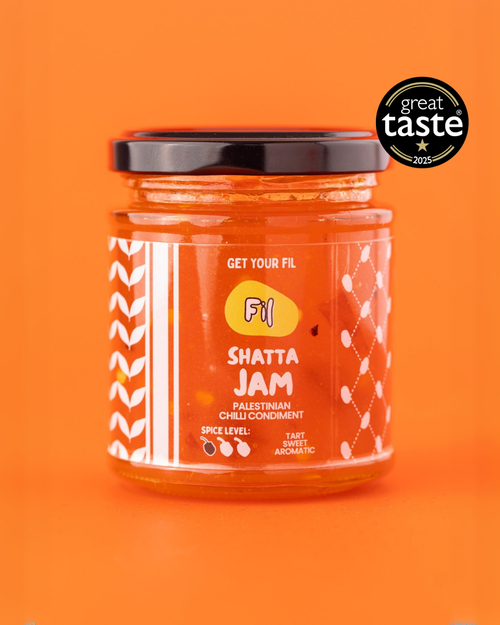Welcome to the Fil newsletter. We told ourselves we wouldn’t start one, but we realised that this space offers something unique that Instagram and other channels do not—an intimate way to connect with our community, and it can’t be replicated elsewhere. So, here we go.
Through this newsletter, we want to go deeper into sharing Palestinian culture, as we know it. Namely, as Palestinians of the diaspora born in Europe and the UK. Our experience is distinct. We cannot and will not claim to speak for Palestinians in Palestine or even those in other parts of the world. As Palestinians as a whole we share the same heritage and hold deep, common affiliation with one another, but at a certain point our experiences begin to diverge due to the different circumstances we each navigate, based on the different external factors upon us. In the same way that I have loved watching Mo on Netflix, I cannot fully relate to his experience. No culture in the world is a monolith, and the larger the society, the more regional distinctions emerge. However Palestinian culture today is unique in how it has been fragmented since 1948, due to the vast diaspora spread across the globe, with each sub-community itself evolving and adapting to the world around it from one generation to the next.
One thing, however, that unites the entire diaspora is food. In our culture, life doesn’t just revolve around the dining table—it’s how we express love. Palestinian cuisine is preserved and treasured, with recipes passed down from one generation to the next. I may not relate to every experience depicted in Mo, but I can damn well relate to his bit on hummus. I can connect with the person I see online flipping Maqlouba: first, placing the serving plate over the top of the pot, 1, 2, 3 then the flip, carefully lowered back onto the table, the drumming of the pot, that collective anticipation as the pot is slowly lifted, the gradual reveal of the fluffy rice, succulent lamb and buttery aubergine (or chicken and cauliflower, if that’s your thing), and lastly, checking the inside of the pot to attribute final judgement on the execution. If you know, you know.
And that brings us to Shatta. What is Shatta? Is it a hot sauce? A chili condiment? A spicy relish? It’s none of those things and all of those things at the same time. In Arabic, Shatta is its own noun—not derived from any other word—simply meaning “spice,” and as a condiment it is used to add heat to almost anything.
Many cultures have their own version of a fermented or cooked chili paste or sauce. Sriracha was one such sauce before it gained global popularity. Sambal in Indonesia, Sahawiq in Yemen, you have Calabrian chilli paste in the south of Italy, Dakkous from Saudi Arabia, and of course harissa from Tunisia. Shatta is the Palestinian version, originating from Gaza but found everywhere in the country. In our households, it sat next to the salt, pepper, and olive oil on the dining table. Sometimes, fresh chilies were used in place of Shatta, but the purpose remained the same—to add spice to any meal.
Every household has its own version of Shatta, and it’s usually sourced from a single family member—commonly, but not exclusively, from teta’s (grandmother’s) kitchen. Because of this, Shatta always finds its way back to the dining table as more than just a condiment; it’s an expression of love, a connection to family, and a link to a time-old culture of food.
When we set out to start Fil, we wanted to create a high-quality Shatta that even teta would be proud of. But more than that, we wanted to create a Shatta that embodied Palestinian culture—the heritage of Shatta itself. That feeling of going to teta’s house and topping up your supply of spicy goodness, of family, love, and community. We wanted to create a Shatta that not just Palestinians could relate to, but that anyone from a displaced culture, diaspora, or mixed heritage could understand, appreciate, and enjoy.
So what is Shatta? Frankly, it’s whatever you want it to be, as long it’s fresh, spicy, and eaten with everything. Just know that next time you do Get Your Fil, you’re getting a jar full of heritage, culture, and identity; one spicy spoonful at a time.
Love, Layth x






0 comments